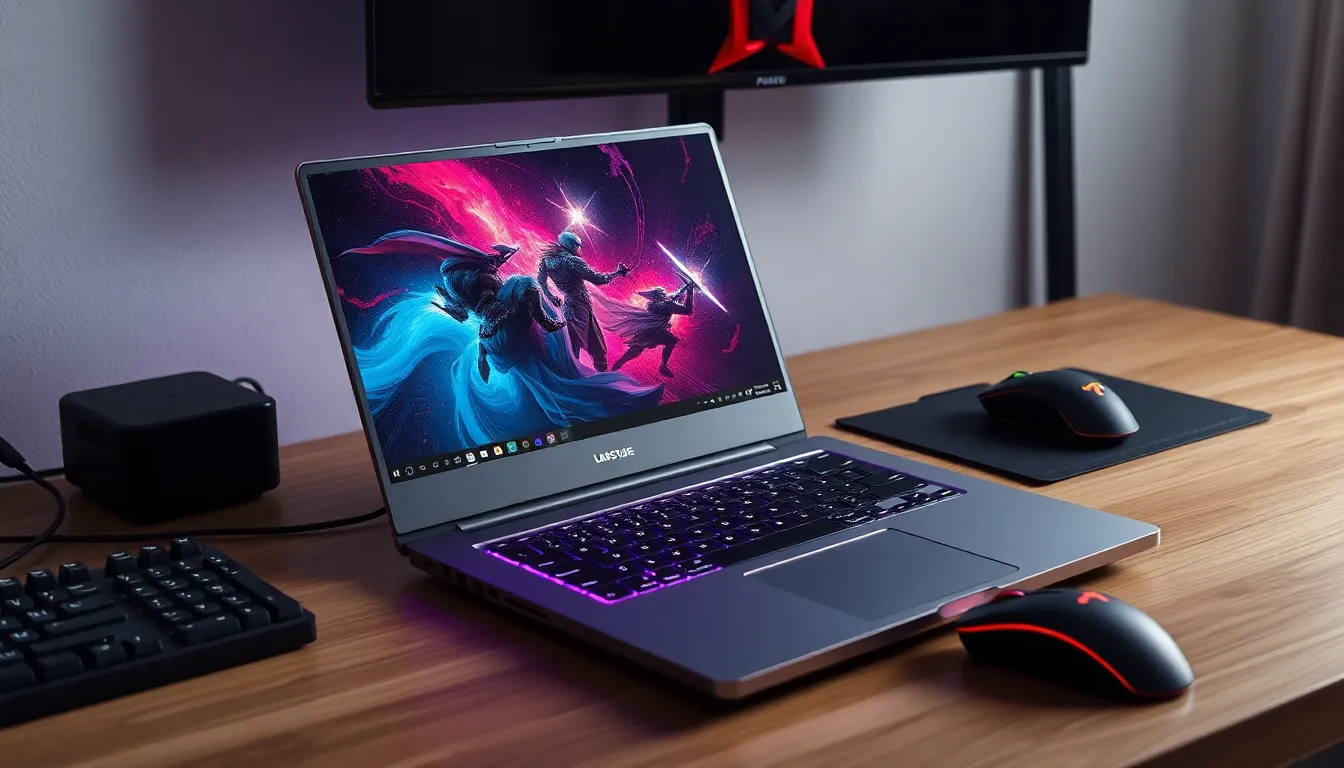In the fast-paced world of gaming, having the right gear can make all the difference. Imagine battling fierce dragons or racing through futuristic cities on a laptop that can barely handle a web browser. Not ideal, right? A gaming laptop isn’t just a fancy accessory; it’s the secret weapon that can elevate a gamer’s experience from “meh” to “wow!”
Table of Contents
ToggleEssential Gaming Laptop Features
Gaming laptops must include specific features to optimize performance. Understanding these elements helps enhance overall gaming experiences.
Performance Specifications
Performance specifications dictate how smoothly games run. He or she should prioritize powerful processors, like Intel i7 or AMD Ryzen 7, for efficient performance. RAM capacity also impacts gaming; 16GB is the minimum for most modern games. Storage solutions, such as SSDs, improve load times and offer substantial speed boosts compared to HDDs. A balance of these specifications ensures games run flawlessly without lag or stutter.
Graphics Processing
Graphics processing plays a critical role in delivering stunning visuals. GPUs from NVIDIA and AMD provide the necessary power for high-resolution gaming. A laptop equipped with at least NVIDIA GeForce GTX 1660 or AMD Radeon RX 5600 XT can handle demanding games effectively. Frame rates greatly depend on GPU performance, making it essential for immersive gameplay. Enhanced graphics settings contribute to a more realistic gaming experience, which gamers often value.
Cooling Systems
Cooling systems maintain optimal temperatures during lengthy gaming sessions. Effective cooling prevents overheating and potential hardware damage. Laptops equipped with dual fans or advanced thermal management systems excel at dissipating heat. Gamers can benefit from models that employ heatsinks for additional heat control. Prioritizing cooling ensures consistent performance without throttling, allowing gamers to focus on their gameplay.
Design and Portability

Gaming laptops blend performance with portability, making design a crucial consideration. A solid gaming laptop features high-quality materials that enhance durability and aesthetics.
Build Quality
Build quality influences longevity and user experience. Aluminum chassis provide strength and resistance against wear. High-quality plastics can offer sturdiness while keeping weight down. Additionally, reinforced hinges contribute to stability and prevent damage from frequent use. Effective designs ensure that components are secured, minimizing the risk of damage during transport. Moreover, RGB lighting or customizable designs appeal to gamers, heightening the aesthetic appeal.
Weight and Dimensions
Weight and dimensions affect portability significantly. Gamers often prefer laptops weighing between 4 to 6 pounds for optimal transportation ease. Dimensions typically vary from 15 to 17 inches for screens, striking a balance between immersive gaming visuals and portability. Compact designs allow for easy storage in backpacks or messenger bags, ensuring gamers can take their devices anywhere. Slim profiles often house powerful components, showcasing advancements in technology that enable portability without sacrificing performance.
Display Characteristics
A gaming laptop’s display characteristics play a vital role in delivering an immersive experience. Key specifications like screen resolution and refresh rate define how vibrant and fluid visuals appear.
Screen Resolution
High-resolution displays enhance gaming visuals significantly. 1920×1080 (Full HD) resolution is standard, allowing for fine detail in graphics. Many gamers opt for 2560×1440 or 3840×2160 (4K) for even sharper images. Higher pixel counts improve clarity, especially in visually demanding games. Also, compatibility with HDR (High Dynamic Range) further elevates color richness and contrast. When selecting a gaming laptop, prioritize the display capability that matches visual expectations and performance needs.
Refresh Rate and Response Time
Refresh rate measures how often the display updates each second. A minimum refresh rate of 60Hz is acceptable, but 120Hz to 240Hz is preferred for competitive gamers. The higher the refresh rate, the smoother the gameplay appears on screen. Additionally, response time affects how quickly pixels change color. Lower response times, around 1ms to 3ms, reduce motion blur and ghosting, resulting in sharper images during fast-paced action. Together, refresh rate and response time ensure a fluid gaming experience, crucial for fast reactions in competitive environments.
Battery Life and Power Management
Battery life and efficient power management enhance the gaming laptop experience. Gamers need systems that last through extended sessions without constant charging.
Efficiency Standards
Many gaming laptops meet specific efficiency standards, ensuring optimal power consumption. Devices featuring NVIDIA’s Max-Q design focus on balancing performance and energy use. Achieving the 80 Plus certification guarantees that the laptop runs efficiently under various loads, reducing wasted energy. Modern gaming processors factor in performance alongside battery longevity, allowing users to enjoy powerful gaming capabilities while conserving power. Utilizing battery-saving modes when gaming less demanding titles extends playtime significantly.
Performance Under Load
Performance under load reflects how well a gaming laptop maintains battery life during intensive tasks. High-quality laptops often sustain performance even while running demanding games. Graphics cards with dynamic power allocation adjust energy use based on task requirements, ensuring efficient resource management. Laptops featuring advanced power management settings can prioritize GPU power during gameplay and conserve resources when idling. By balancing these features, gamers experience enhanced performance with fewer interruptions, contributing to an overall immersive gaming experience.
Connectivity Options
Connectivity options define how a gaming laptop interacts with other devices. Understanding these features allows gamers to maximize their experience and ensure compatibility with various peripherals.
Ports and Interfaces
USB ports serve critical roles in connecting external devices. Gaming laptops often include multiple USB-A and USB-C ports to accommodate peripherals like mice, keyboards, and external drives. HDMI and DisplayPort outputs are essential for linking the laptop to larger monitors or TVs, supporting multiple displays for an immersive setup. Ethernet ports also matter, providing wired internet connections for stable online play. Additionally, audio jacks enable the use of quality headphones or external speakers, enhancing the auditory experience.
Wireless Capabilities
Wireless connectivity options influence gaming performance and convenience. Most gaming laptops come equipped with Wi-Fi 6 technology, offering faster speeds and reduced latency compared to previous standards. Bluetooth capabilities allow for seamless connections to accessories, including controllers, headsets, and mice. An integrated webcam enhances communication for multiplayer gaming. Using advanced wireless technologies ensures gamers maintain a competitive edge without being tethered to their devices.
Choosing the right gaming laptop can transform a player’s experience. With essential features like powerful processors and high-quality GPUs gamers can tackle demanding titles without compromise. The importance of an effective cooling system and robust design ensures longevity and performance during intense sessions.
Display quality and refresh rate play a crucial role in immersion allowing gamers to fully engage in their virtual worlds. Connectivity options further enhance versatility enabling seamless integration with various peripherals.
Investing in a gaming laptop equipped with these features not only boosts performance but also elevates enjoyment ensuring that every gaming session is both thrilling and uninterrupted.




